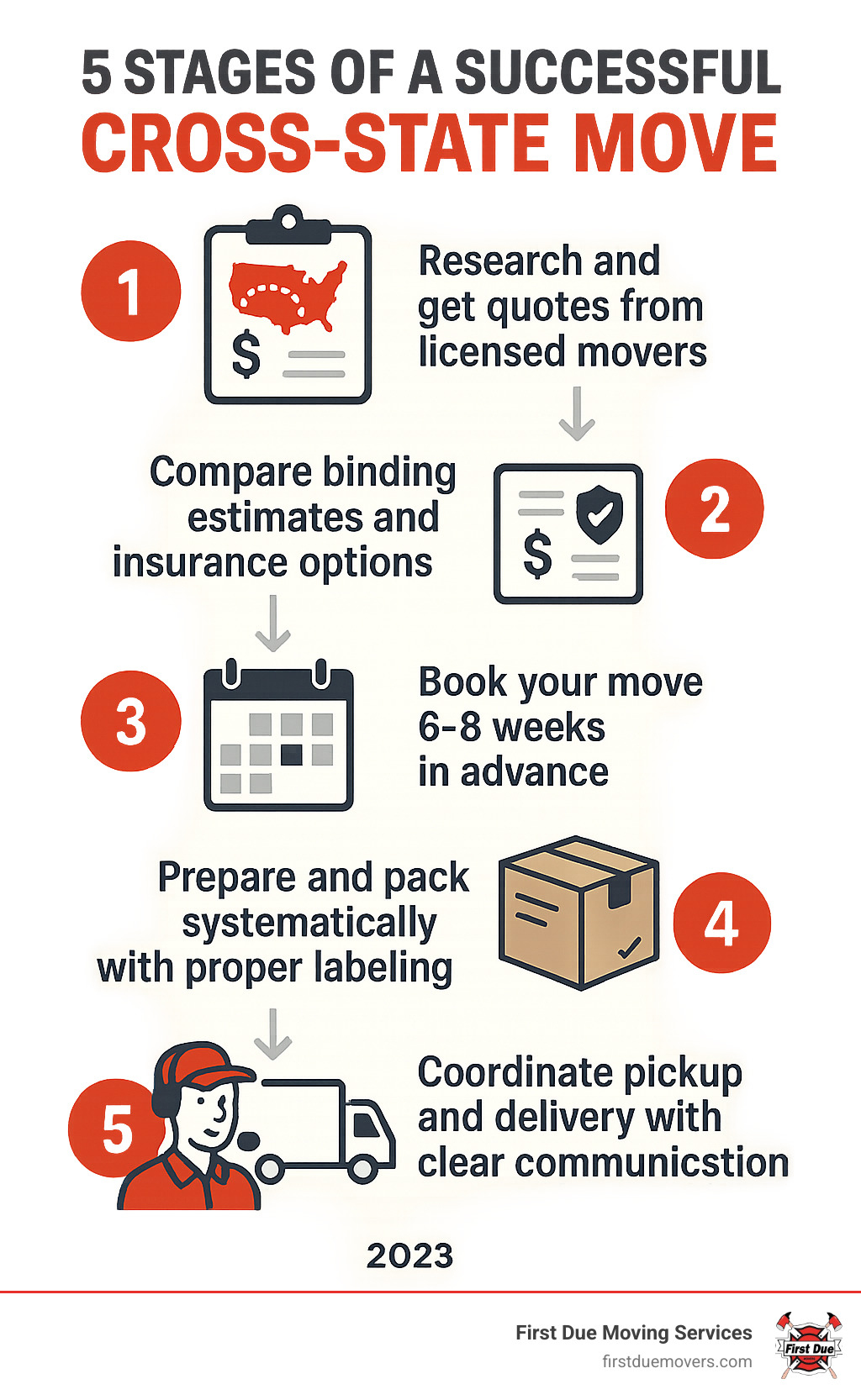Cross State Movers: Top Revealed for 2025
Why Choosing the Right Cross-State Mover Matters
Cross state movers can make or break your long-distance relocation experience. Whether you’re moving from Washington to California or Texas to Florida, finding a trustworthy moving company is crucial for protecting your belongings and your sanity.
Reputable cross-state moving companies can be identified by a few key traits. They are typically full-service movers or established van lines with active FMCSA registration, a valid DOT number, proper licensing, and comprehensive insurance.
The moving industry has a reputation problem. Many people find cross-country moving “a really shady industry” filled with brokers who low-ball prices and add hidden fees later. But reputable movers do exist—you just need to know how to find them.
Red flags to avoid:
- Companies requiring large upfront deposits
- Estimates that seem too good to be true
- No physical address or proper licensing
- Poor or fake online reviews
The difference between a smooth move and a nightmare often comes down to one thing: doing your homework. Research shows that movers with decades of experience and proper FMCSA registration offer the most reliable service, though they may cost more than sketchy brokers.
This guide will help you identify trustworthy cross state movers, understand pricing, and plan a stress-free relocation.
Understanding Your Cross-State Moving Options
When planning a cross state move, you have several options, each with its own benefits. Understanding these can help you choose the service that best fits your needs and budget.
Full-Service Moving Solutions
This is the most comprehensive option, where professional cross state movers handle nearly every aspect of your relocation. Services typically include:
- Professional Packing: Teams carefully pack your belongings using high-quality materials.
- Loading and Unloading: Movers do all the heavy lifting at both your old and new homes.
- Transportation: Your items are transported in a dedicated moving truck.
- Disassembly and Reassembly: Large furniture is taken apart and put back together.
- Optional Services: Unpacking, crating, and temporary storage are often available.
The primary benefit of hiring licensed, full-service movers is the convenience and peace of mind. It frees you to focus on other aspects of your relocation and is ideal for those who want to minimize physical effort and stress.
Container-Based Moving Services
This hybrid approach offers flexibility. A container is delivered to your home, you load it at your own pace, and then the company transports it to your new location for you to unload. Container services balance affordability and convenience, as you save on labor costs but still get professional transportation. They are a great solution for complex moves or if you need temporary storage.
Do-It-Yourself (DIY) Moving
This involves renting a truck and handling everything yourself—packing, loading, driving, and unloading. While it’s the most budget-friendly option, it requires significant physical effort and time. Driving a large rental truck long distances can be daunting and is best suited for smaller moves if you have the time and ability.
The right service depends on your priorities. Whether you opt for full-service support, container flexibility, or a hands-on DIY approach, planning is key.
| Feature | Full-Service Movers | Container-Based Movers |
|---|---|---|
| Cost Transparency | Often based on inventory, distance, and services. | Based on container size, distance, and time of year. |
| Labor Support | All loading, unloading, and often packing provided. | You do the loading/unloading; company handles transport. |
| Convenience | Maximum convenience, minimal personal effort. | Flexible loading/unloading schedule, less driving stress. |
| Safety | Professional handling, specialized equipment. | Sturdy containers, secure transport. |
How to Find and Vet Reputable Cross-State Movers
The moving industry can be difficult to steer. As a company founded by firefighters, we know trust and reliability are paramount. Finding trustworthy cross state movers requires careful attention to detail.
Start with FMCSA Registration and USDOT Numbers
Every legitimate interstate moving company must have FMCSA registration and a valid USDOT number—it’s federal law. This number is the company’s official ID, proving they can legally operate across state lines and giving you access to their safety record. You can confirm your mover has an active DOT number on the FMCSA website. If a company can’t provide this number, it’s a major red flag.
Dig Deep into Reviews and Reputation
Online reviews offer insight into a company’s customer service. Look for detailed stories about specific experiences, not just generic five-star ratings. Pay attention to patterns in negative reviews, as multiple complaints about hidden fees or damaged items suggest deeper problems. We also recommend checking a company’s standing with the Better Business Bureau to see how they handle customer complaints.
Understand the Broker vs. Mover Difference
This distinction is critical. Moving brokers are middlemen who sell your move to the lowest bidder, which can lead to unreliable service and unexpected costs. Direct moving companies (like van lines) own their trucks and employ their own crews, ensuring clear accountability. When something goes wrong, you know exactly who to call.
Spot the Red Flags
Trust your instincts. Be wary of these warning signs:
- Large upfront deposits: Legitimate movers typically collect payment upon delivery.
- Estimates that seem too good to be true: A quote dramatically lower than others is a major red flag.
- No physical address or licensing information.
- High-pressure sales tactics: Professionals will give you time to make a decision.
- Door-to-door sales pitches.
Taking time to vet your moving company is far less painful than dealing with damaged belongings, surprise fees, or movers who hold your items hostage.
Decoding the Costs and Contracts of an Interstate Move
Understanding how cross state movers calculate costs and structure contracts is key to avoiding surprises. At First Due Moving Services, we believe in the transparency that guides our fire service values, so we want you to know what goes into your quote.
Key Factors That Influence Your Moving Quote
Several factors determine the cost of your cross state move:
- Distance: The farther your belongings travel, the higher the cost due to fuel and driver time.
- Shipment Weight: Most movers price based on the total weight of your items. Decluttering before you move can lower your costs.
- Seasonality: Moving during the peak summer season (May-August) is more expensive. Consider an off-season move for better rates.
- Additional Services: Professional packing, crating specialty items, and storage solutions add to the base cost but can be worth the investment.
- Types of Estimates: A non-binding estimate is a guess, while a binding estimate locks in your price. A binding not-to-exceed estimate is often best, as you’ll never pay more than quoted but could pay less. Always insist on an in-home or virtual survey for the most accurate quote.
What to Look for in Your Contract and Insurance
Your moving contract is your protection. Read it carefully before signing.
- Bill of Lading: This is your contract and receipt. It outlines all services, charges, and delivery windows. Ensure it matches what you agreed to.
- Inventory List: Before loading, movers document each item and its condition. Review this list carefully, as it’s your proof of what was loaded. We recommend taking your own photos of valuable items.
- Insurance Protection: Federal law requires movers to offer two options. Released Value Protection is basic, no-cost coverage that only pays 60 cents per pound per item—insufficient for most valuables. Full-Value Protection costs extra but ensures the mover must repair, replace, or pay the current market value for any lost or damaged items. For most people, this is worth the peace of mind.
Understanding the claims process beforehand is also crucial. To learn more about your rights, you can learn about mover liability protection under federal law.
Your Master Plan for a Smooth Relocation
Moving across state lines can feel overwhelming, but with the right preparation, you can turn chaos into a well-orchestrated plan. At First Due Moving Services, we’ve seen that following a solid game plan transforms moving stress into success.
Best Strategies for Packing for a Cross-State Move
Your belongings will travel hundreds or thousands of miles, so they need extra protection and organization.
- Declutter: Sell, donate, or toss items you no longer need. Less stuff means lower moving costs.
- Pack Room by Room: This keeps you organized and makes unpacking much easier.
- Use a Detailed Labeling System: Label boxes with their contents and destination room. Mark fragile items clearly.
- Create an Essentials Box: Pack a separate box with everything you’ll need for the first 48 hours (toiletries, medications, chargers, clothes, important documents) and keep it with you.
- Protect Valuables: Keep irreplaceable items like jewelry, family photos, and important papers with you, not on the moving truck.
- Use Smart Packing Techniques: Use small boxes for heavy items (like books) and large boxes for light items (like linens). Use towels and blankets for padding. Disassemble furniture and keep hardware in a labeled bag taped to the piece.
How Long Do Cross-State Movers Typically Take?
Understanding the timeline for a cross state move helps set realistic expectations.
- Loading and Unloading Time: This varies based on the size of your home and its accessibility. A large home can take most of the day.
- Transit Time: Federal regulations limit truck drivers to about 400-500 miles per day. A coast-to-coast move will naturally take several days.
- Delivery Window: Most movers provide a delivery window (e.g., 3-5 days) rather than a specific date to account for variables like weather, traffic, or mechanical issues.
- Service Options: Standard delivery may share truck space with other customers, extending the timeline but lowering costs. Expedited service provides a dedicated truck for a faster, more direct route at a premium price.
Clear communication with your moving team is key. Reputable movers will keep you updated on the timeline so you’re never left wondering.
Frequently Asked Questions about Moving Across States
We’ve helped countless families with their cross state moves and have noticed the same questions come up often. From our firefighter background, we believe in being prepared and informed. Let’s tackle these common concerns.
What items will movers not transport across state lines?
For safety and regulatory reasons, professional cross state movers have strict rules on what they can transport. Prohibited items generally include:
- Hazardous materials: Flammables (paint, solvents, propane tanks), explosives (fireworks, ammunition), corrosives (bleach, acids), and aerosol cans.
- Perishable food: Any food from your refrigerator or freezer should be consumed, given away, or disposed of.
- Live plants: Due to temperature fluctuations and state agricultural regulations, most movers will not transport plants on long-distance moves. It’s best to transport them in your personal vehicle.
- Pets: Pets must always travel with you in your vehicle, not in the moving truck.
- Valuables: Keep irreplaceable items like jewelry, important documents, cash, and family heirlooms in your personal possession.
When in doubt, ask your moving coordinator before moving day.
Should I tip my cross-state movers?
Tipping is customary and appreciated for good service but is not required. If your crew is punctual, careful, and professional, a tip is a great way to show gratitude.
- How much? A common guideline is $40-$100 per mover for a full day’s work.
- Who to tip? You may have different crews for loading and unloading. If so, plan to tip both teams separately when they complete their work.
- How to tip? Cash is preferred, but any gesture of thanks, including a positive online review, is valued.
What should I know about working with a moving company?
Think of your relationship with cross state movers as a partnership. A successful move requires both you and your movers to do your part.
- Mover Responsibilities: Your movers bring expertise, equipment, and professionalism. They should handle your items safely, adhere to the contract, and keep you informed.
- Your Responsibilities: You bring preparation. Being packed and ready on moving day, with pathways cleared, helps everything run smoothly.
- Communication is Critical: Don’t be afraid to ask questions or voice concerns. Open communication ensures everyone is on the same page and helps achieve the goal of a safe, successful move.
Conclusion
Moving across state lines is a major undertaking, but with this guide, you have a roadmap for a successful journey. The most important lesson is that choosing the right cross state movers is about finding a trustworthy partner, not just the cheapest quote. Always verify a mover’s FMCSA registration and USDOT number, read reviews, and trust your gut.
By understanding costs, packing smart, and planning ahead, you can ensure your belongings arrive safely, keep stress manageable, and enjoy the excitement of a fresh start.
At First Due Moving Services, we know trust is everything. Our fire service values of dedication, integrity, and professionalism are the foundation of every move we handle. We treat your relocation with the care and precision of an emergency call because we know it’s your life and your new beginning.
Ready to turn your moving stress into moving success? Plan your Washington move with professional movers in Issaquah. We’re here to help you get there safely and professionally.



